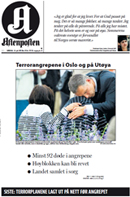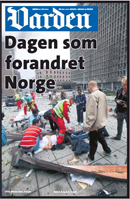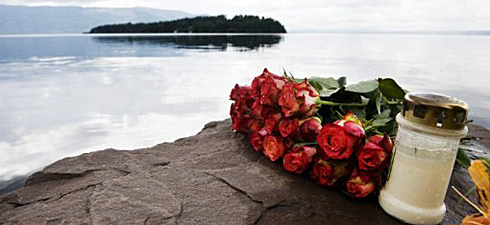We will never forget the unthinkable 24 hours we have just experienced. It was a day that must never be forgotten.
But first, we should express our grief for those who died in Utøya [the island where the young socialist summer camp was located] and in the centre of Oslo. It is a grief that we will continue to carry with us. And while we rebuild the government district [which was devastated by the explosion] and the while the AUF (Arbeidernes Ungdomsfylking, the youth section of the Labour party) reorganises, we will also have to rebuild a Norway founded on openness and trust.
We have every reason to be angry and we should be angry. Terrorism and mass murder are incomprehensible, and it would be wrong to demonstrate any form of understanding for brutal acts of this kind. As the Prime Minister [Labour party leader Jens Stoltenberg] has said, we have been plunged into a tale of blood death and fear.
A man has been arrested, and we do not yet know if he acted alone, or if he had accomplices. Clearly, this question must be investigated. And it must be subject to an in-depth investigation that precludes any outcome that might favour terrorist goals. This can only be accomplished through a properly controlled judicial procedure, in accordance with the values that we want to prevail in Norway in the wake of 22 July 2011. We do not want a Norway with more restrictions on movement, more uniforms and more intervention in the private lives of those who refuse to acknowledge the language of terrorism, because such a change would mark a victory for the terrorists.
 We want a Norway founded on the values of liberty and equality, which were so important to the young people assembled on Utøya, and which continue to be so important to most of the citizens of this country.
We want a Norway founded on the values of liberty and equality, which were so important to the young people assembled on Utøya, and which continue to be so important to most of the citizens of this country.
We should praise the members of our government, who have been exemplary in restricting their statements to expressions of grief, and in avoiding any disgraceful debate on who is to blame or the the level of spending devoted to security. Our other politicians have also behaved in the same responsible manner. And if we continue to conduct debate in this way, we will revive the spirit of Norway.
It is still possible to come upon a government minister in the street
Over the last ten years, events around the world have obliged us to face new challenges in many fields. The need for greater security has grown, and with it we have seen the introduction of new police methods which in their bid to capture a handful of criminals have disrupted the lives of millions of innocent citizens. In this country, it is still possible to come upon a government minister in the street, but now we will have to prepare for change.
For a few hours yesterday, we had the feeling that Norway was under occupation [as it was during the war, and especially in the context of the police deployment that followed the explosion]. Fortunately, this was not the case.
 Now we must be careful to prevent fear from taking hold, as it did in the United States in the wake of 9 September, 2011. Norway is a country that works well. Over the last 24 hours, we have seen how police, health care services, civil defence forces and volunteers have taken charge of the work of aiding victims and the investigating this crime.
Now we must be careful to prevent fear from taking hold, as it did in the United States in the wake of 9 September, 2011. Norway is a country that works well. Over the last 24 hours, we have seen how police, health care services, civil defence forces and volunteers have taken charge of the work of aiding victims and the investigating this crime.
We have also seen our politicians demonstrate a clear understanding of their role, notably with regard to the role of the police, because we do not need politicians who play at being police. It is up to the police to investigate and to prevent criminal acts, which must be judged in a court of law. And we must be careful to ensure that trials are conducted within the framework provided by current legislation.
What we do not yet know is to the extent of the damage to the minds and souls of those who have been affected by these intolerable events. Nor do we know how we will face the future having lost all of these young people who were engaged in the drive to create a better society for the future.
This is the kind of damage that cannot be remedied with bricks and concrete. This is the kind of damage that all of us will have to work to repair. And this is the damage that has made us so angry and desperate today.
Was this article useful? If so we are delighted!
It is freely available because we believe that the right to free and independent information is essential for democracy. But this right is not guaranteed forever, and independence comes at a cost. We need your support in order to continue publishing independent, multilingual news for all Europeans.
Discover our subscription offers and their exclusive benefits and become a member of our community now!












